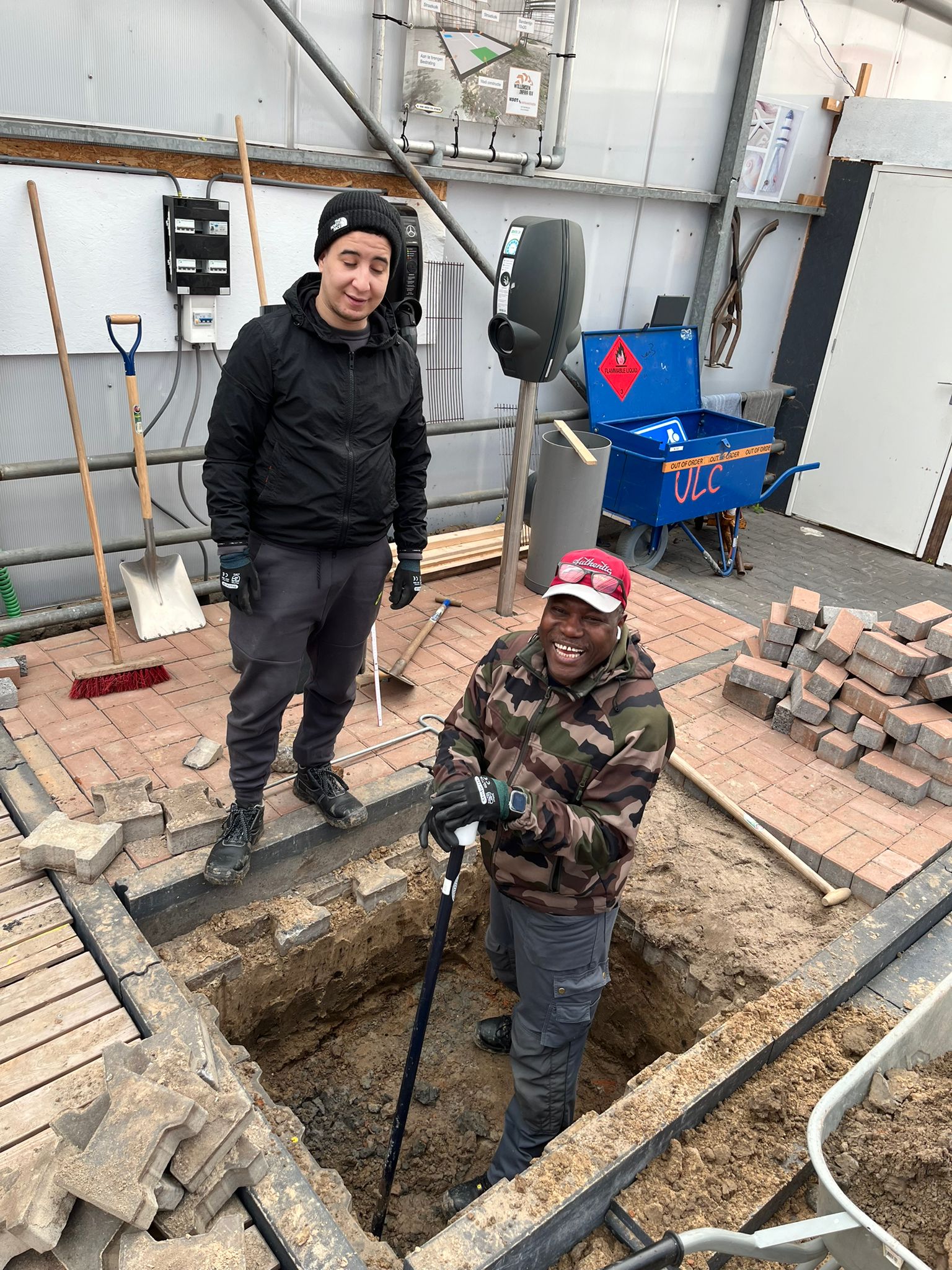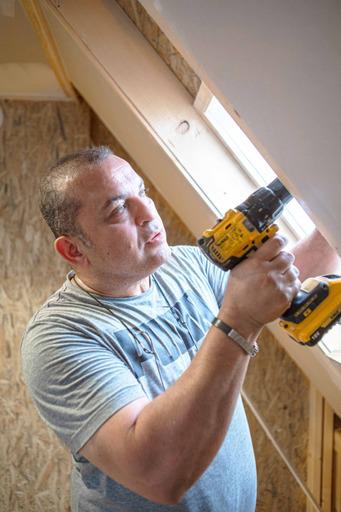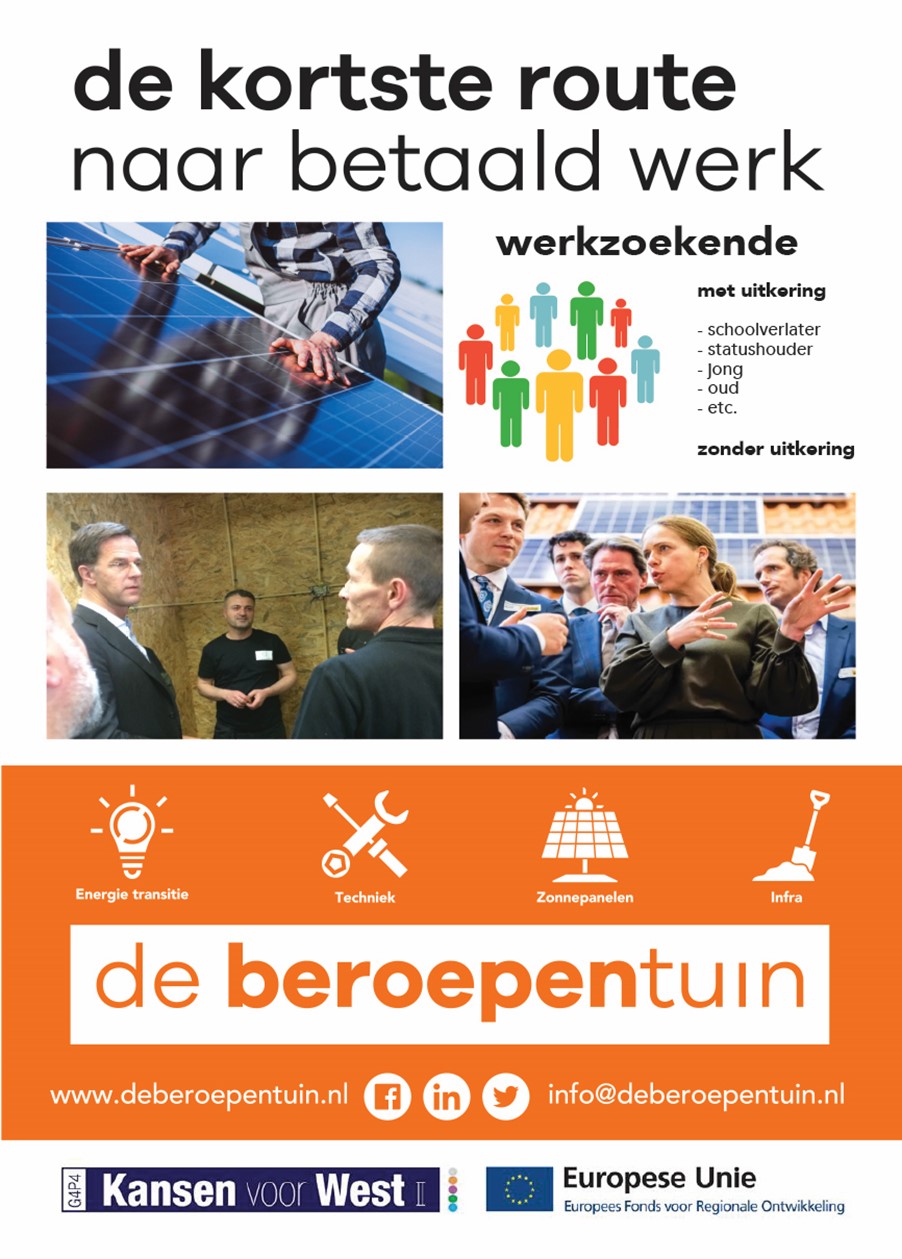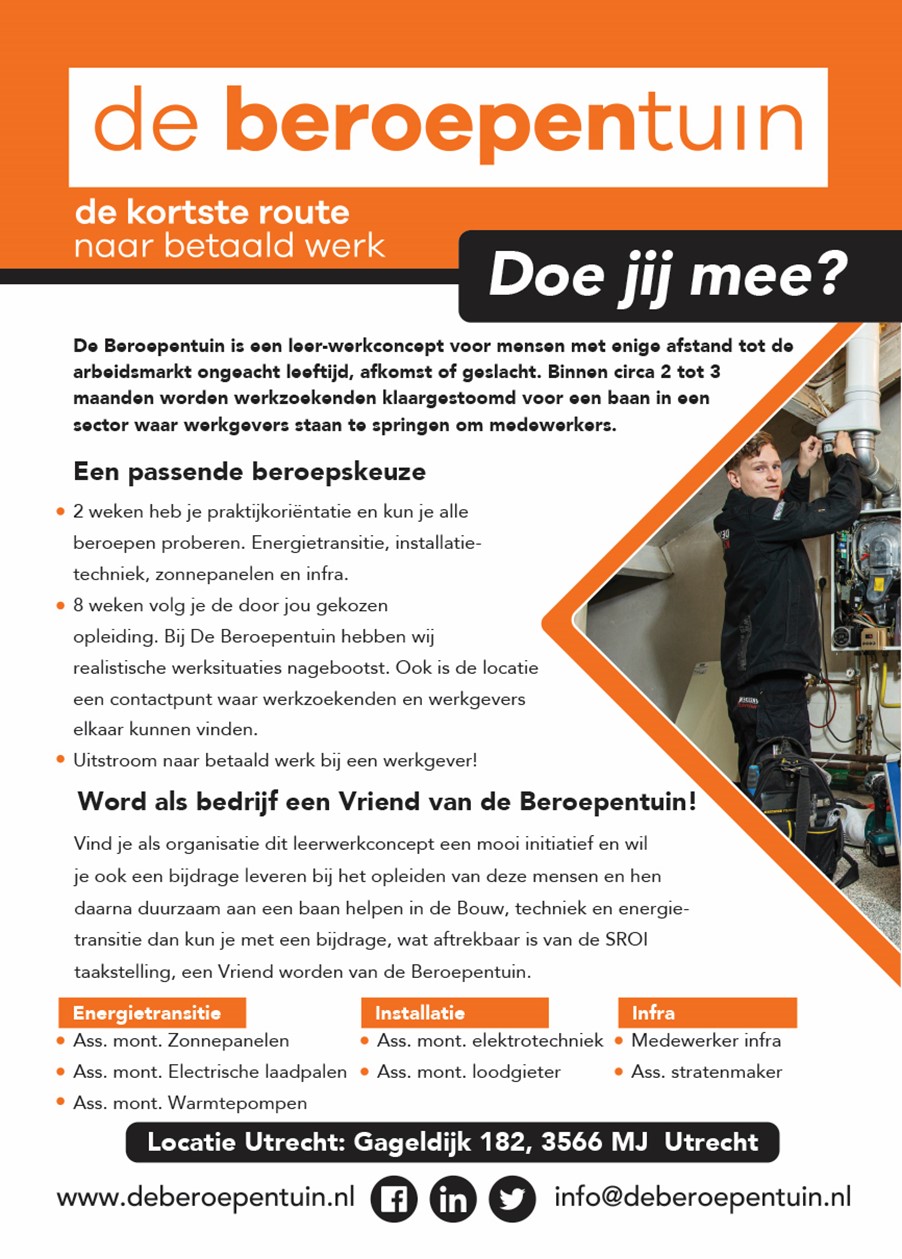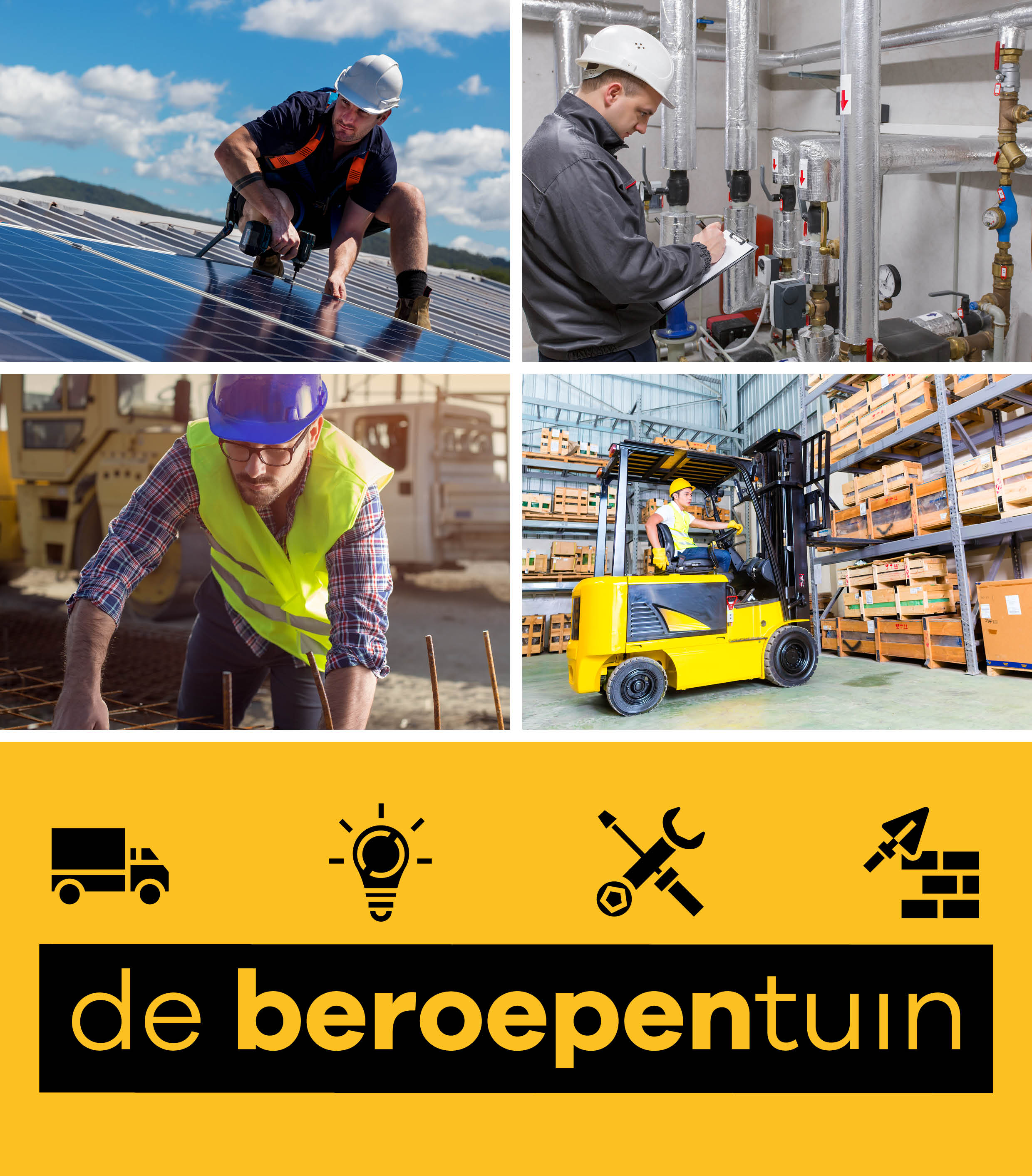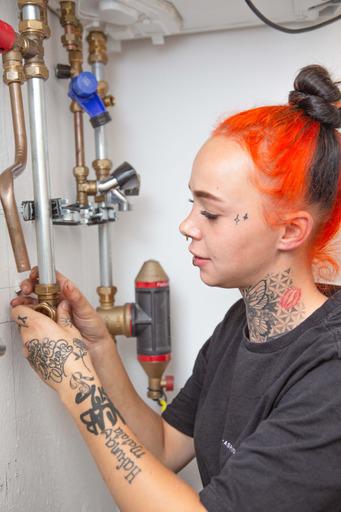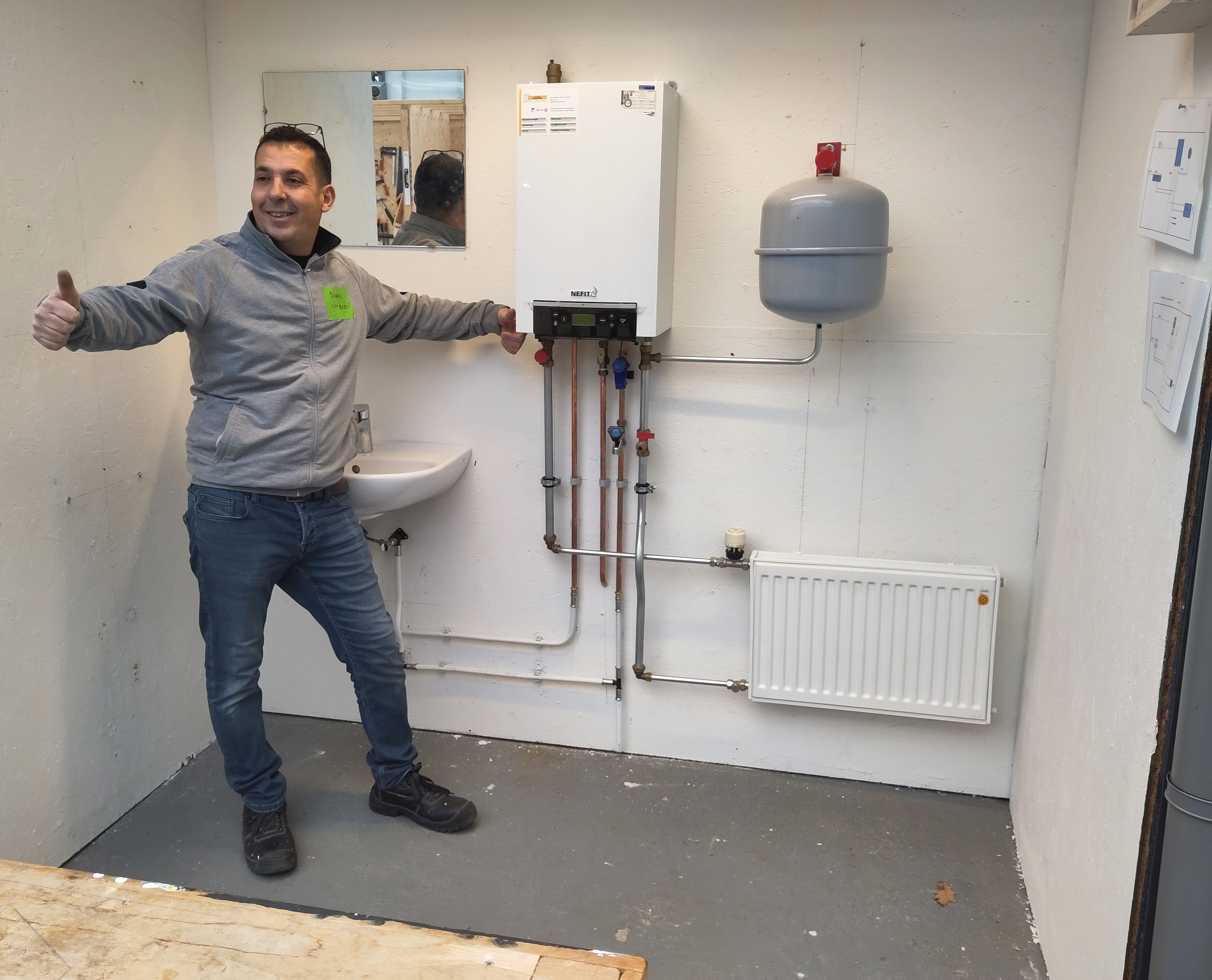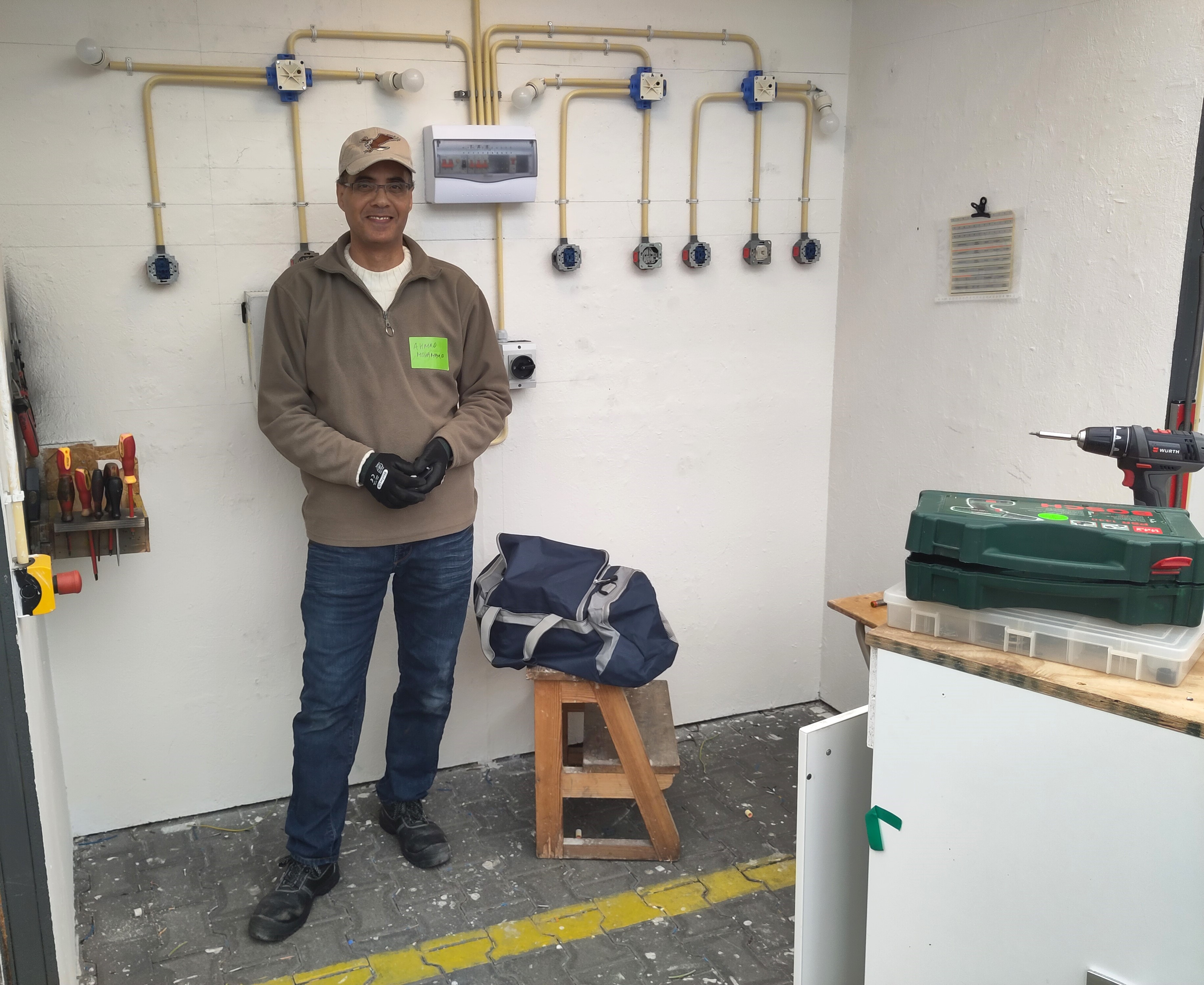Prioritising the places and people that need it the most
De beroepentuin
An innovative learning and work concept in energytransition and technology!
The Beroepentuin is an inclusive learning and work program that helps individuals with barriers to employment, refugees, status holders, and school dropouts etc.. Stats with a 2-week orientation in technology, followed by a 3-month program to make participants job-ready. Our coaching, training, and job-fit support prepare them for careers in technology and energy transition. Awarded by the Social Economic Council (SER) as the most inclusive SME in the Netherlands, we provide opportunities for a
Netherlands
Regional
In the following provinces South Holland, North Holland, Utrecht, Gelderland.
It addresses urban-rural linkages
It refers to other types of transformations (soft investment)
Yes
2021-12-01
Yes
ERDF : European Regional Development Fund
No
No
As a representative of an organisation
The Beroepentuin project is designed to help individuals become "work fit" and prepare them for careers in the fields of technology and energy transition. The target group includes young people, status holders, candidates with a distance to the labor market, school dropouts, benefit recipients, and individuals with personal or social challenges ("rugzak").
Participants start with a 2-week orientation period, which allows them to explore different career paths. After this, they follow a 12-week in-depth training program where they gain hands-on skills and knowledge in technical fields such as construction, carpentry, and areas related to technology and energy transition. This program provides them with a recognized start qualification, making them more competitive in the job market.
In addition to technical training, the program also includes practical lessons on job application procedures, interview techniques, and customized language courses to help participants improve their communication skills. At the end of the program, participants receive assistance with job placement, where we connect them to potential employers and support their transition into the workforce.
The Beroepentuin collaborates closely with both the education sector and the labor market to ensure the training we offer is aligned with industry needs. Based on the demands of employers, we have shaped our learning pathways to meet the specific requirements of the job market. This collaboration helps ensure that participants gain the skills employers are looking for, increasing their chances of securing stable employment in the technology and energy transition sectors.
Participants start with a 2-week orientation period, which allows them to explore different career paths. After this, they follow a 12-week in-depth training program where they gain hands-on skills and knowledge in technical fields such as construction, carpentry, and areas related to technology and energy transition. This program provides them with a recognized start qualification, making them more competitive in the job market.
In addition to technical training, the program also includes practical lessons on job application procedures, interview techniques, and customized language courses to help participants improve their communication skills. At the end of the program, participants receive assistance with job placement, where we connect them to potential employers and support their transition into the workforce.
The Beroepentuin collaborates closely with both the education sector and the labor market to ensure the training we offer is aligned with industry needs. Based on the demands of employers, we have shaped our learning pathways to meet the specific requirements of the job market. This collaboration helps ensure that participants gain the skills employers are looking for, increasing their chances of securing stable employment in the technology and energy transition sectors.
Workforce readiness
Creating a new talent pool
Career development
Technology & energy transition
People with a distance to the labor market
Beroepentuin project focuses on empowering individuals with barriers to employment while promoting sustainability through green practices. It aims to create a impact socially, economically, and environmentally by preparing participants for careers in technology and energy transition.
Social Sustainability: The project supports people facing significant challenges, such as young people, status holders, school dropouts, and individuals with personal or social barriers. It provides training, practical work experience, and job placement support to help them integrate into the workforce. This fosters social inclusion, reduces unemployment, and promotes long-term self-sufficiency, empowering individuals for sustainable careers.
Economic Sustainability: In collaboration with local businesses and educational institutions, the Beroepentuin ensures that the training provided meets the needs of the labor market, especially in technology and energy transition sectors. The project addresses skills shortages in these industries and prepares participants to meet the demands of the growing green economy. This partnership creates a sustainable talent pipeline, supporting long-term economic growth.
Environmental Sustainability: The project promotes environmental sustainability by focusing on energy-efficient technologies and green building practices. Participants are trained for roles in renewable energy and energy-efficient construction, aligning with global sustainability goals. The Beroepentuin also incorporates sustainable practices in its operations, such as reusing materials and reducing waste, ensuring that participants not only learn sustainable skills but also contribute to eco-friendly practices.
The project highlights the importance of circular principles, teaching participants to use recycled materials in construction and other areas. Material reuse promotes sustainability within the industry.
Social Sustainability: The project supports people facing significant challenges, such as young people, status holders, school dropouts, and individuals with personal or social barriers. It provides training, practical work experience, and job placement support to help them integrate into the workforce. This fosters social inclusion, reduces unemployment, and promotes long-term self-sufficiency, empowering individuals for sustainable careers.
Economic Sustainability: In collaboration with local businesses and educational institutions, the Beroepentuin ensures that the training provided meets the needs of the labor market, especially in technology and energy transition sectors. The project addresses skills shortages in these industries and prepares participants to meet the demands of the growing green economy. This partnership creates a sustainable talent pipeline, supporting long-term economic growth.
Environmental Sustainability: The project promotes environmental sustainability by focusing on energy-efficient technologies and green building practices. Participants are trained for roles in renewable energy and energy-efficient construction, aligning with global sustainability goals. The Beroepentuin also incorporates sustainable practices in its operations, such as reusing materials and reducing waste, ensuring that participants not only learn sustainable skills but also contribute to eco-friendly practices.
The project highlights the importance of circular principles, teaching participants to use recycled materials in construction and other areas. Material reuse promotes sustainability within the industry.
The Beroepentuin project focuses on creating an enriching experience for participants by emphasizing aesthetics and cultural benefits. Through thoughtful design and a commitment to fostering an inclusive environment, the project ensures that participants feel valued, motivated, and inspired throughout their journey.
Design and Environment: The physical spaces at Beroepentuin are designed to be both functional and visually appealing. There is an atmosphere conducive to learning and skill development. The workspace is organized to encourage collaboration, creativity, and engagement, which helps participants feel a sense of pride in their surroundings. By combining functionality with aesthetic appeal, the project enhances the overall quality of the participants' experience, ensuring they have the resources and environment necessary to thrive.
Cultural Benefits and Inclusivity: The Beroepentuin promotes a culture of inclusion, where people from diverse backgrounds, including young people, status holders, school dropouts, and individuals facing personal challenges, feel welcome and supported. The project embraces cultural diversity, celebrating the different experiences and perspectives of its participants. Beroepentuin received an award as the most inclusive company in the Netherlands by the Social and Economic Council (SER) as an SME. This inclusive approach fosters a sense of belonging, which is essential for building self-confidence and encouraging personal growth. Additionally, the project incorporates cultural awareness into the curriculum, ensuring participants can learn from each other’s experiences, thus enriching the learning environment.
Aesthetic Learning Materials: Learning materials are visually engaging and interactive, making complex topics accessible. The use of appealing resources keeps participants engaged and enhances their learning experience.
Design and Environment: The physical spaces at Beroepentuin are designed to be both functional and visually appealing. There is an atmosphere conducive to learning and skill development. The workspace is organized to encourage collaboration, creativity, and engagement, which helps participants feel a sense of pride in their surroundings. By combining functionality with aesthetic appeal, the project enhances the overall quality of the participants' experience, ensuring they have the resources and environment necessary to thrive.
Cultural Benefits and Inclusivity: The Beroepentuin promotes a culture of inclusion, where people from diverse backgrounds, including young people, status holders, school dropouts, and individuals facing personal challenges, feel welcome and supported. The project embraces cultural diversity, celebrating the different experiences and perspectives of its participants. Beroepentuin received an award as the most inclusive company in the Netherlands by the Social and Economic Council (SER) as an SME. This inclusive approach fosters a sense of belonging, which is essential for building self-confidence and encouraging personal growth. Additionally, the project incorporates cultural awareness into the curriculum, ensuring participants can learn from each other’s experiences, thus enriching the learning environment.
Aesthetic Learning Materials: Learning materials are visually engaging and interactive, making complex topics accessible. The use of appealing resources keeps participants engaged and enhances their learning experience.
The Beroepentuin project focuses on inclusion by ensuring accessibility, affordability, and equal opportunities for all participants, especially those with barriers to employment, status holders, school dropouts, and individuals facing personal challenges.
Accessibility and Affordability: Training costs are shared between the government, employers, sector associations, and other stakeholders, making it accessible to all, including those from lower-income backgrounds. This collaborative funding model ensures that no one is excluded, offering individuals the chance to explore and assess whether a career in technology suits them. It provides a supportive platform for those who would otherwise be unable to access such opportunities due to financial constraints.
Inclusive Design: The Beroepentuin creates a welcoming and supportive learning environment for all participants, including those with physical, cognitive, or personal challenges. The spaces and materials are designed to be accessible, ensuring that everyone, including individuals with a “rugzak,” receives the necessary support to progress. The project’s design fosters growth, giving participants the tools to move forward in both life and career.
Diverse Target Groups: The Beroepentuin serves a broad range of individuals, including young people, status holders, school dropouts, and those with personal difficulties. The project provides training in high-demand sectors like construction and energy transition, ensuring participants improve their employability and can explore if these sectors align with their career aspirations.
Workplace Skills Development: In addition to technical training, the Beroepentuin focuses on workplace skills such as communication, teamwork, and professionalism. These essential skills help participants develop confidence and competence, equipping them for long-term success in the workforce.
Accessibility and Affordability: Training costs are shared between the government, employers, sector associations, and other stakeholders, making it accessible to all, including those from lower-income backgrounds. This collaborative funding model ensures that no one is excluded, offering individuals the chance to explore and assess whether a career in technology suits them. It provides a supportive platform for those who would otherwise be unable to access such opportunities due to financial constraints.
Inclusive Design: The Beroepentuin creates a welcoming and supportive learning environment for all participants, including those with physical, cognitive, or personal challenges. The spaces and materials are designed to be accessible, ensuring that everyone, including individuals with a “rugzak,” receives the necessary support to progress. The project’s design fosters growth, giving participants the tools to move forward in both life and career.
Diverse Target Groups: The Beroepentuin serves a broad range of individuals, including young people, status holders, school dropouts, and those with personal difficulties. The project provides training in high-demand sectors like construction and energy transition, ensuring participants improve their employability and can explore if these sectors align with their career aspirations.
Workplace Skills Development: In addition to technical training, the Beroepentuin focuses on workplace skills such as communication, teamwork, and professionalism. These essential skills help participants develop confidence and competence, equipping them for long-term success in the workforce.
Beroepentuin project integrates citizens and civil society in a meaningful way, ensuring that the program aligns with the needs of participants and benefits from their input. The goal is to develop a program that addresses community needs while encouraging active participation from diverse groups.
Role of Participants: Individuals, particularly those facing employment barriers, status holders, school dropouts, and those with personal challenges, are directly involved in determining their learning journey. They are given the chance to explore potential careers in technology, focusing on gaining practical experience. By taking part in training, workshops, and other activities, participants not only advance their own development but also provide valuable feedback that helps refine and enhance the project.
Employer and Sector Association Involvement: The collaboration between the Beroepentuin and employers, along with sector associations, is vital for the program’s success. These stakeholders help shape the curriculum based on market demands, ensuring it remains relevant. Employers actively participate by offering training, apprenticeships, and job placements for graduates, playing a key role in shaping the program’s outcomes.
Community Engagement: The Beroepentuin fosters open communication with the local community, schools, and civil society groups to ensure inclusivity. Through partnerships, the project reaches a wide audience in need of support. Input from participants and community members informs decisions, ensuring that the program is continually adapted to meet emerging needs.
Impact of Involvement: The engagement of citizens and civil society has significantly enhanced the program. Participant feedback offers insights into their goals and challenges, allowi. Collaboration with employers guarantees real-world skill development, which in turn boosts employability, while sector associations ensure the project remains aligned with industry standards.
Role of Participants: Individuals, particularly those facing employment barriers, status holders, school dropouts, and those with personal challenges, are directly involved in determining their learning journey. They are given the chance to explore potential careers in technology, focusing on gaining practical experience. By taking part in training, workshops, and other activities, participants not only advance their own development but also provide valuable feedback that helps refine and enhance the project.
Employer and Sector Association Involvement: The collaboration between the Beroepentuin and employers, along with sector associations, is vital for the program’s success. These stakeholders help shape the curriculum based on market demands, ensuring it remains relevant. Employers actively participate by offering training, apprenticeships, and job placements for graduates, playing a key role in shaping the program’s outcomes.
Community Engagement: The Beroepentuin fosters open communication with the local community, schools, and civil society groups to ensure inclusivity. Through partnerships, the project reaches a wide audience in need of support. Input from participants and community members informs decisions, ensuring that the program is continually adapted to meet emerging needs.
Impact of Involvement: The engagement of citizens and civil society has significantly enhanced the program. Participant feedback offers insights into their goals and challenges, allowi. Collaboration with employers guarantees real-world skill development, which in turn boosts employability, while sector associations ensure the project remains aligned with industry standards.
The Beroepentuin project has been shaped by collaboration at local, regional, national, and European levels.
Local Level: The municipality and local business association initiated the project, focusing on local needs. The municipality provided resources, and businesses shaped the program to align with industry demands, offering internships and job opportunities.
Regional Level: Regional governments and provincial support offered additional funding and connected the project with regional businesses and educational institutions, ensuring its alignment with broader workforce strategies.
National and European Levels: The project received an EFRO subsidy, allowing the professionalization of learning paths. Collaboration with the ROC (Regional Education Center) ensured the training met national standards, while the EFRO funding helped develop curricula aligned with industry requirements.
Employers and Education Providers: Employers shaped the curriculum and provided practical placements, while educational institutions, such as the ROC, ensured the training was accredited. The "six eyes principle" was used to evaluate candidates, with assessments from educators, employers, and mentors.
Added Value: Stakeholder involvement ensured the project met the needs of both participants and employers, creating a sustainable model for workforce development that equips participants with relevant skills for the labor market.
Local Level: The municipality and local business association initiated the project, focusing on local needs. The municipality provided resources, and businesses shaped the program to align with industry demands, offering internships and job opportunities.
Regional Level: Regional governments and provincial support offered additional funding and connected the project with regional businesses and educational institutions, ensuring its alignment with broader workforce strategies.
National and European Levels: The project received an EFRO subsidy, allowing the professionalization of learning paths. Collaboration with the ROC (Regional Education Center) ensured the training met national standards, while the EFRO funding helped develop curricula aligned with industry requirements.
Employers and Education Providers: Employers shaped the curriculum and provided practical placements, while educational institutions, such as the ROC, ensured the training was accredited. The "six eyes principle" was used to evaluate candidates, with assessments from educators, employers, and mentors.
Added Value: Stakeholder involvement ensured the project met the needs of both participants and employers, creating a sustainable model for workforce development that equips participants with relevant skills for the labor market.
The Beroepentuin project addresses the growing shortage of skilled professionals in the Netherlands, especially in sectors crucial for the energy transition. The program offers entry-level training in installation technology, electrical systems, solar energy, and electric vehicle (EV) charging stations, all of which are in high demand as the country shifts to sustainable energy.
Participants receive foundational training in plumbing and electrical systems, equipping them with essential skills for roles in renewable energy and sustainable construction. The program also focuses on solar energy, where there is a significant need for qualified solar panel installers. Furthermore, with the rise in electric vehicle use, the demand for trained professionals to install EV charging stations is increasing, and the Beroepentuin addresses this need by providing practical training in this area.
The project aims to not only provide entry-level training but also create a pathway for long-term career growth. Participants are encouraged to pursue a BBL (Beroepsbegeleidende Leerweg) track, which combines work-based learning with further education. This ensures participants gain hands-on experience while working alongside professionals in the field, preparing them for future employment.
The collaboration between professionals in installation technology, electrical systems, and renewable energy helps keep the curriculum aligned with labor market needs. The added value of this approach is that it prepares individuals for in-demand roles, supporting the transition to sustainable energy while addressing the skills gap in the Dutch labor market.
Participants receive foundational training in plumbing and electrical systems, equipping them with essential skills for roles in renewable energy and sustainable construction. The program also focuses on solar energy, where there is a significant need for qualified solar panel installers. Furthermore, with the rise in electric vehicle use, the demand for trained professionals to install EV charging stations is increasing, and the Beroepentuin addresses this need by providing practical training in this area.
The project aims to not only provide entry-level training but also create a pathway for long-term career growth. Participants are encouraged to pursue a BBL (Beroepsbegeleidende Leerweg) track, which combines work-based learning with further education. This ensures participants gain hands-on experience while working alongside professionals in the field, preparing them for future employment.
The collaboration between professionals in installation technology, electrical systems, and renewable energy helps keep the curriculum aligned with labor market needs. The added value of this approach is that it prepares individuals for in-demand roles, supporting the transition to sustainable energy while addressing the skills gap in the Dutch labor market.
The Beroepentuin project is a pioneering initiative that stands apart from traditional training programs by offering a fast-track route to employment. Participants begin with two weeks of orientation, followed by 12 weeks of focused training, and then transition directly into a job. This streamlined process allows candidates to quickly gain the necessary skills and confidence to enter the workforce.
A key innovative feature of the project is the integration of essential worker competencies. In addition to technical training, participants learn important job skills, including vocational language, VCA certification (health and safety qualifications), and practical, hands-on experience. This ensures that candidates are fully prepared for real-world work environments.
Another unique aspect of the Beroepentuin is the support provided to individuals facing personal barriers. By helping them overcome challenges and equipping them with the skills needed for a successful career, the project creates a pathway for those who might otherwise struggle to find employment.
Additionally, Beroepentuin integrates modern technology into the job application process. Candidates use an app to apply for jobs, where they can submit a video pitch to potential employers. This innovative approach enables participants to showcase their skills and personality in a way that goes beyond traditional CVs, providing employers with a more comprehensive view of the candidate.
With its combination of practical training, personal support, and innovative use of technology, Beroepentuin is the first program in the Netherlands to offer such an integrated learn-and-work experience, making it a groundbreaking model for workforce development in sectors critical to the energy transition.
A key innovative feature of the project is the integration of essential worker competencies. In addition to technical training, participants learn important job skills, including vocational language, VCA certification (health and safety qualifications), and practical, hands-on experience. This ensures that candidates are fully prepared for real-world work environments.
Another unique aspect of the Beroepentuin is the support provided to individuals facing personal barriers. By helping them overcome challenges and equipping them with the skills needed for a successful career, the project creates a pathway for those who might otherwise struggle to find employment.
Additionally, Beroepentuin integrates modern technology into the job application process. Candidates use an app to apply for jobs, where they can submit a video pitch to potential employers. This innovative approach enables participants to showcase their skills and personality in a way that goes beyond traditional CVs, providing employers with a more comprehensive view of the candidate.
With its combination of practical training, personal support, and innovative use of technology, Beroepentuin is the first program in the Netherlands to offer such an integrated learn-and-work experience, making it a groundbreaking model for workforce development in sectors critical to the energy transition.
Beroepentuin project uses a dynamic and hands-on approach to workforce development, focusing on both candidate orientation and practical experience. The methodology begins with a two-week orientation period, where candidates have the opportunity to explore and evaluate whether the field they are considering is the right fit for them. During this time, mentors assess if the candidate is well-suited for the chosen path. This allows for early identification of potential and areas for development, ensuring that the candidates are prepared for the training that follows.
After the orientation phase, candidates embark on a 12-week learning track tailored to their personal preferences. This track is predominantly practical, with minimal theory. The approach is designed to be highly relevant to the job market, with candidates gaining the skills they need to succeed in their chosen field. The focus is on real-world, hands-on learning, ensuring that participants are ready to enter the workforce with confidence.
Examinations are held by a combination of education providers, mentors, and employers. This ensures that the training is directly aligned with the expectations of the labor market, and the assessment process is robust, providing both educational and industry-specific feedback.
The strength of the Beroepentuin lies in its ability to stay closely connected to the rapidly changing job market and technology trends. While traditional education systems often lag behind industry developments, the Beroepentuin adapts quickly to emerging technologies and shifting market demands. By working closely with employers, sector experts, and mentors, the project ensures that training programs are always up-to-date, offering candidates the skills that are most in demand.
This agile, hands-on approach allows Beroepentuin to meet both the needs of candidates and employers, providing a fast, effective pathway to employment in sectors critical for the energy transition and beyond.
After the orientation phase, candidates embark on a 12-week learning track tailored to their personal preferences. This track is predominantly practical, with minimal theory. The approach is designed to be highly relevant to the job market, with candidates gaining the skills they need to succeed in their chosen field. The focus is on real-world, hands-on learning, ensuring that participants are ready to enter the workforce with confidence.
Examinations are held by a combination of education providers, mentors, and employers. This ensures that the training is directly aligned with the expectations of the labor market, and the assessment process is robust, providing both educational and industry-specific feedback.
The strength of the Beroepentuin lies in its ability to stay closely connected to the rapidly changing job market and technology trends. While traditional education systems often lag behind industry developments, the Beroepentuin adapts quickly to emerging technologies and shifting market demands. By working closely with employers, sector experts, and mentors, the project ensures that training programs are always up-to-date, offering candidates the skills that are most in demand.
This agile, hands-on approach allows Beroepentuin to meet both the needs of candidates and employers, providing a fast, effective pathway to employment in sectors critical for the energy transition and beyond.
The methodology and processes employed by the Beroepentuin project are highly transferable and can be replicated in other regions or contexts, especially in areas facing similar challenges regarding employment and skills shortages. The core approach of combining two weeks of orientation, followed by 12 weeks of hands-on training tailored to individual candidates, has proven to be effective in bridging the gap between education and employment.
The key components—practical, job-oriented training, personal career coaching, and employer-driven curriculum development—are adaptable to different sectors and markets. The fact that the curriculum is designed in close collaboration with employers ensures that it is always aligned with the current labor market needs, which can be applied in other industries as well. Additionally, the use of an app for candidates to apply for jobs, complete video pitches, and improve their employability skills is an innovative aspect that could be replicated for any job-training program.
Our belief is that it’s not about the Beroepentuin itself, but rather about the candidates and meeting the demands of the market. We are committed to doing meaningful work and are eager to collaborate with others who are equally passionate about making a positive impact. We are open to sharing our knowledge and experience, so that others can benefit from and implement this process in their own communities.
By focusing on candidates' needs and continually adapting the program to market demands, we believe this model can create lasting value in other places and for other groups of beneficiaries. We would be more than happy to work together with those who share the same mission to create opportunities and address the skills gaps in the labor market.
The key components—practical, job-oriented training, personal career coaching, and employer-driven curriculum development—are adaptable to different sectors and markets. The fact that the curriculum is designed in close collaboration with employers ensures that it is always aligned with the current labor market needs, which can be applied in other industries as well. Additionally, the use of an app for candidates to apply for jobs, complete video pitches, and improve their employability skills is an innovative aspect that could be replicated for any job-training program.
Our belief is that it’s not about the Beroepentuin itself, but rather about the candidates and meeting the demands of the market. We are committed to doing meaningful work and are eager to collaborate with others who are equally passionate about making a positive impact. We are open to sharing our knowledge and experience, so that others can benefit from and implement this process in their own communities.
By focusing on candidates' needs and continually adapting the program to market demands, we believe this model can create lasting value in other places and for other groups of beneficiaries. We would be more than happy to work together with those who share the same mission to create opportunities and address the skills gaps in the labor market.
The Beroepentuin project tackles several global challenges by providing local solutions that directly address both societal and environmental issues. One key challenge it addresses is the global skills shortage, particularly in sectors critical to the energy transition, such as renewable energy, electrical systems, and installation technology. By offering practical, entry-level training in these areas, Beroepentuin equips individuals with the necessary skills to meet the demands of a rapidly evolving labor market. This approach ensures that participants are well-prepared for long-term employment in high-demand sectors.
Another significant global challenge the project addresses is inclusive employment. In many regions, vulnerable groups such as refugees, school dropouts, and individuals facing personal barriers struggle to enter the labor market. Beroepentuin offers these individuals the opportunity to acquire new skills, gain work experience, and secure sustainable employment, contributing to reducing inequality and fostering social inclusion. Through a hands-on, supportive training environment, Beroepentuin helps participants overcome personal challenges and succeed in their career paths.
In response to the global push for a more sustainable energy future, Beroepentuin focuses on training participants in solar energy and charging station installation. These areas are essential to the energy transition, and by preparing individuals for these fields, the project directly contributes to meeting global sustainability goals.
By closely aligning its training programs with market needs and offering practical, real-world skills, Beroepentuin provides participants with clear career pathways, ensuring they are ready for the workforce. The project not only addresses the skills gap but also fosters environmental sustainability and social inclusion, offering a model that could be replicated in other regions facing similar challenges.
Another significant global challenge the project addresses is inclusive employment. In many regions, vulnerable groups such as refugees, school dropouts, and individuals facing personal barriers struggle to enter the labor market. Beroepentuin offers these individuals the opportunity to acquire new skills, gain work experience, and secure sustainable employment, contributing to reducing inequality and fostering social inclusion. Through a hands-on, supportive training environment, Beroepentuin helps participants overcome personal challenges and succeed in their career paths.
In response to the global push for a more sustainable energy future, Beroepentuin focuses on training participants in solar energy and charging station installation. These areas are essential to the energy transition, and by preparing individuals for these fields, the project directly contributes to meeting global sustainability goals.
By closely aligning its training programs with market needs and offering practical, real-world skills, Beroepentuin provides participants with clear career pathways, ensuring they are ready for the workforce. The project not only addresses the skills gap but also fosters environmental sustainability and social inclusion, offering a model that could be replicated in other regions facing similar challenges.
Over the past four years, Beroepentuin has helped more than 1,000 people with a distance to the labor market find employment in the technical and energy transition sectors. By addressing labor shortages while providing individuals with stable jobs and future prospects, we create a win-win situation for both workers and industries.
Our initiative has also had a significant economic and social impact. By reducing dependence on social benefits—estimated at €40,000 at least per unemployed person per year—we have saved the government millions. More importantly, employment fosters financial independence, strengthens families, and stimulates local economies, creating stronger and more resilient communities.
In addition to economic benefits, Beroepentuin contributes to sustainability by training individuals for green jobs, supporting the Netherlands' climate goals, and ensuring a future-proof workforce. Our commitment to inclusion has been recognized by the Social and Economic Council (SER), which named us the most inclusive SME in the Netherlands.
Looking ahead, we aim to expand our reach, strengthen partnerships with businesses and educational institutions, and advocate for more inclusive employment opportunities. Beroepentuin proves that workforce inclusion not only empowers individuals but also strengthens the economy and society as a whole.
Our initiative has also had a significant economic and social impact. By reducing dependence on social benefits—estimated at €40,000 at least per unemployed person per year—we have saved the government millions. More importantly, employment fosters financial independence, strengthens families, and stimulates local economies, creating stronger and more resilient communities.
In addition to economic benefits, Beroepentuin contributes to sustainability by training individuals for green jobs, supporting the Netherlands' climate goals, and ensuring a future-proof workforce. Our commitment to inclusion has been recognized by the Social and Economic Council (SER), which named us the most inclusive SME in the Netherlands.
Looking ahead, we aim to expand our reach, strengthen partnerships with businesses and educational institutions, and advocate for more inclusive employment opportunities. Beroepentuin proves that workforce inclusion not only empowers individuals but also strengthens the economy and society as a whole.


